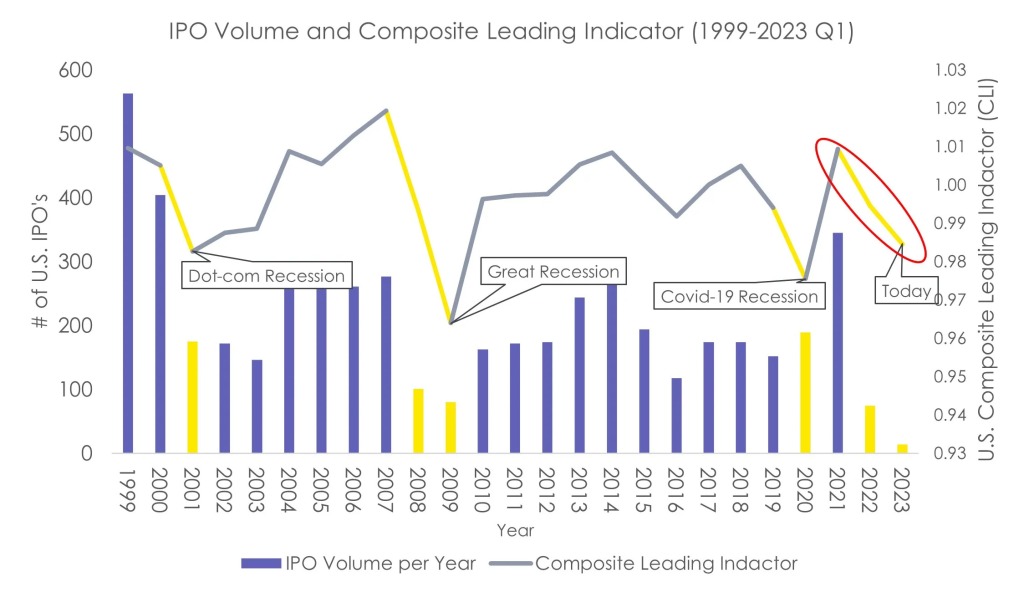Telling a Compelling Equity Story for a Recession IPO
Meet the Author
As Seen in: AlternativesWatch.com

on July 27, 2023.
Given the current uncertainty in the U.S. economy, companies are rightfully hesitant to go public via initial public offering (IPO). As investors tend to be more risk-averse and cautious in their investment decisions, raising capital through an IPO during recessions and bear markets can be an especially challenging task.
The Organization for Economic Cooperation and Development (OECD) system of Composite Leading Indicators (CLIs) is designed to provide early signals of turning points in business cycles and fluctuation in the output gap, i.e., fluctuation of the economic activity around its long-term potential level.
During the three most recent recessions: Covid-19 (2020-2021), the Great Recession (2007-2009), and the Dot-com Recession (2000-2001), IPO activity plummeted in tandem with CLI, but eventually rebounded as the economic outlook brightened.
Knowing how to tell an equity story is crucial to attracting investors, and bringing in the right banking partner is critical to supporting that story and fostering IPO success.

CRAFTING AN APPEALING INVESTMENT STORY
A well-prepared equity story should portray the company as an appealing investment through both quantitative and qualitative descriptions.
Current Capital Allocation/Shareholder Structure – A clear financial picture, as well as a financing track record, can help give context to the history, growth, and success of the company. It can also highlight parallels to other companies that achieved IPO success under similar circumstances. In fact, PitchBook data shows companies that went public during recessions (on average) reflected larger revenues, gross profit, and EBITDA compared to companies that went public in the six months prior to a recession. They also had more favorable unlevered free cash flow (FCF) margin and debt to equity ratios.

History – Investors hear hundreds of stories each year and may have little to no awareness of the company and its background. A comprehensive history should incorporate prior accomplishments and notable company milestones.
Business Model and Competitive Advantage – It’s important to paint a detailed picture of the industry, addressable market, and status and strategies of current competitors.
Future Outlook – A look ahead at the market in which the company operates, related sectors, and the economy overall shows investors you’re thinking ahead.
Management Team – A seasoned team can reassure potential investors and highlight skills and qualities that differentiate the company from its competitors.
By seamlessly pairing quantitative and qualitative elements, a well-told equity story addresses investors’ concerns about how the company navigates uncertain times and builds a foundation for IPO success.
SUPPORTING THE EQUITY STORY
Every good story needs backup, and support from a third-party advisor can help make the equity story even more compelling. Advisors can add value by helping to prepare the market, financial, and operational analysis needed to support and stress-test the equity story before engaging investment bankers.
In addition, a third-party advisor can provide management with a preliminary view of key industry-specific topics that concern equity analysts and capital markets participants.
For equity story preparation, external advisors can:
Partner with the finance team – Given the time commitments of going public, advisors can act as an extension of the company’s Finance team to prepare financial information in support of the equity story.
Perform in-depth analysis and forecasting – Detailed analyses of the company’s operations can provide a clear and compelling picture of its financial and operational performance and future growth prospects.
Ensure data integrity and consistency – Advisors can ensure that financial statements accurately reflect the company’s underlying transactions and that any potential issues or discrepancies are addressed. This may involve cleansing and validating data from various sources, consolidating data into a single format, and developing data room schedules to make it easy for potential investors to access and understand the information.
Provide investor relations support – Advisors can provide valuable support in preparing detailed responses to questions from potential investors, equity analysts, and other stakeholders. This can include conducting ad-hoc analysis, providing additional information, and crafting clear and compelling responses to questions.
The post-downturn IPO rebound is consistently led by companies that persevere in the face of economic uncertainty. For those considering an IPO in a challenging economy, it’s crucial to tell a compelling equity story to attract and persuade investors, and it’s helpful to have trusted advisors in your corner. This combination of storytelling and support will lead to effective public entry and long-term success.





